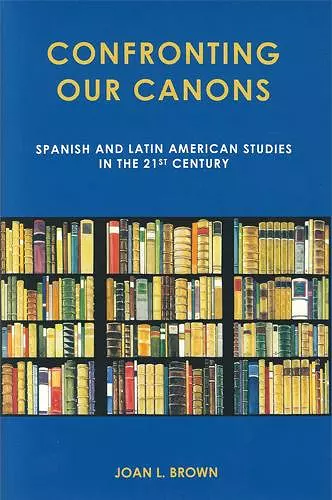Confronting Our Canons
Spanish and Latin American Studies in the 21st Century
Format:Paperback
Publisher:Associated University Presses
Published:12th Mar '14
Currently unavailable, and unfortunately no date known when it will be back
This paperback is available in another edition too:
- Hardback£87.00was £87.00(9781611483512)

What is a canon and why does it matter? In Confronting Our Canons: Spanish and Latin American Studies in the 21st Century, Joan L. Brown shows that a canon has the power to define a field and determine what is taught. She argues that it is both productive and necessary to confront our canons, to see what is actually in them and how these works and authors got there. Only then can educators take charge of their teaching canons and, by extension, their disciplines. Brown demonstrates that there is little agreement in the reported teaching canons in English and Spanish. Analyzing twentieth- and twenty-first-century required graduate reading lists in Spanish and Latin American literature in the United States, she finds that the core literary canon for graduate students is less comprehensive than the Spanish Advanced Placement reading list for high school students. She encourages the field of Hispanic studies—curators of the cultural patrimony of our country's second language—to take the lead in developing a diverse, flexible, shared foundational canon at the graduate level, before the arbiters of "best practices" do this for us.
Confident and authoritative, well-written and balanced, provocative and controversial: this is an excellent book, a call to arms and action, that all shapers and readers of literary canons should study with care. -- David T. Gies, University of Virginia, University of Virginia
Scholars must confront their canons, argues Brown (Spanish, U. of Delaware), in order to understand their contents and their pedagogical consequences, and only then take action to ensure that these consequences are the ones the scholars intend. She takes examples and evidence from her own field, but does not expect readers to read Spanish, and nearly all the titles she mentions are available in English translation. Her topics include literary canon formation in Western history, modern canons from least to most consensual, the Hispanic literary canon as the contents of an album and its missing contents, factors that make a work canonical, and a mandate for reform. * Book News, Inc. *
A fundamental book for scholars of Spanish, Latin American, and U.S. Hispanic literatures and cultures. Summing up: Essential. Graduates students, researchers, faculty. * Choice Reviews *
This is a timely and illuminating book. The canon has a nebulous existence, since most of us refer to it, affirming or contesting it, but few can say with any precision or authority what it contains. Joan Brown set out to find an answer by gathering information about graduate reading lists, which sensibly can be seen as including those works considered fundamental, that is, canonical, for anyone receiving advanced degrees in departments of Spanish and Latin American studies. The results are well organized, framed by a preliminary discussion about he history of literary canons, a description of results culled for Spanish and Latin American studies in two different periods (1998, when there were 56 leading PhD granting institutions considered, and ten years later, when only 49 continued offering the degree), a discussion about the many gaps of these requirements, and a consideration of what may help to place a work in these lists. The book concludes with a well-argued call for action to insure the readings are more comprehensive, less idiosyncratic, and better coordinated across the profession. * Project Muse *
One of the important contributions of Confronting our Canons is drawing attention to the interpenetration of canon formation, disciplinary definition, and pedagogy. Brown compellingly argues that neglecting our pedagogical canon negatively impacts more than just reading requirements; it affects our profession at all levels. Adding support to the book’s sound arguments, the data analysis demonstrates the urgency of a reform that not only should ensure greater consensus but also remedy omissions that are unjustifiable. * Project Muse *
Brown anchors her discussion on a well-grounded introduction on the nature of a canon and its significance, which is underscored by a historical approach to canon formation in the Western tradition....The proposal merits careful consideration given the growing stress on institutional accountability, the central position of Hispanic Studies in Foreign Languages, and the growing political clout of the Hispanic population in the U.S.A. * Project Muse *
ISBN: 9781611485585
Dimensions: 224mm x 152mm x 18mm
Weight: 372g
248 pages